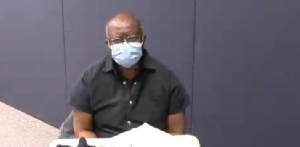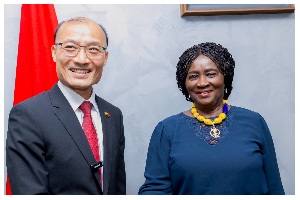Despite being over fifty-two years old, basic social amenities such portable water, good roads, well-equipped hospitals, and good schools continue to elude the country. The few amenities and infrastructure available in the country, also, are being left to deteriorate.
Accra and Kumasi are two of Ghana’s most developed cities; yet the road that links them is in a terrible state. The same can be said about many other roads in other parts of the country.
The hospitals in the country are in an even worse state. Not only do they lack basic facilities and equipment needed to provide good health care for the citizenry, they also lack adequate infrastructure and medical personnel. It isn’t surprising in some cases therefore, to find patients and even pregnant women sleeping on benches and on the floor in our hospitals, when they should be receiving the best of care.
To worsen matters, medical personnel have become lackadaisical and indifferent in their approach to work. Nurses, especially, threaten, insult and in some cases, beat up patients whom they are supposed to patiently care for. As a result of these, many people continue to die mostly from curable diseases. Many of our expectant mothers also continue to die in childbirth.
Our educational sector is even worse off. The structures are simply not in place. It has become normal to see students reading and writing under trees and canopies, where they are vulnerable to the weather.
The state of affairs in the country is generally bad. Extreme poverty and unemployment has led to increased sufferings and difficulties. There has also been an increase in crime rate in the country. As a result of the foregoing, many Ghanaians have realized that in order to have a good life in such a difficult country, one has to be as educated as possible. This is almost non-negotiable. Education has become utterly imperative if one wishes to have a good life. So many people are relentlessly making efforts to acquire the highest educational qualifications in spite of the unfavorable economic conditions.
One of such people is Eva Alordina. She knew education was vital to having a successful life, so she took her studies seriously and managed to get admission to study Business Administration at the Nkrumah University of Science and Technology (KNUST), in Kumasi. She had high hopes that she would eventually become someone beneficial to her family and the society at large. However, on Saturday the 24th of April, everything came to an end for Eva. She was leaving the Independence hall with a friend, Gertrude Kyere Davies when she was crushed to death by a falling slab of concrete. Her friend Gertrude, who also got trapped under the slab, is on admission at the hospital after sustaining serious injuries. They had gone to the Independence hall to have a group discussion with their friends in preparations for their end of semester examinations. As it turned out, the hall which was constructed in 1957 has not undergone any major rehabilitation.
Needless to say, it is the government that should take the primary blame for Eva’s death, although it’s imperative that the authorities at KNUST explain why they failed to ensure the general safety of the two students. Even if government cannot provide our educational institutions with adequate infrastructure and facilities, what prevents it from renovating existing ones? Why should a fifty year old structure, which perpetually comes under enormous pressure from students, be left unrefurbished? Should we always wait for people to die before the right things are done? At the University of Ghana, for instance, it’s not uncommon to find about fifteen students ‘perching’ in a room just because hostel facilities in the institute are inadequate. The situation is no different in the nation’s other universities. Indeed, in an institution like the Ghana Institute of Journalism, there is no hostel facility at all. Sometimes I wonder what the priority of government is. When it comes to providing parliamentarians with millions of dollars in car loans and housing allowances, or spending millions of dollars on national celebrations such as Ghana @ 50, the government is a heavy weight champion. But when it comes to providing things that directly benefit majority of Ghanaians such as portable water, good roads, security, and equipping the Police and Fire Service, you find the government missing in action. Essentially, the bulk of the country’s money is being spent on a few-the elite- in society, while the majority continues to live in pain and penury. People are dying everyday as a result of the actions and inactions of government. Some are killed on the bad roads that government has refused to construct; others die due to poor health care, while some commit suicide out of frustration. Those who are fortunate to survive all these, still risk being killed by armed robbers. Why do people rob? Majority of those who rob, do so because they have to survive, despite there being no jobs. Unemployment has caused majority of our youth to turn to cyber fraud or sakawa, which currently employs over a hundred thousand Ghanaian youths. Though Sakawa is bad and should be rigorously condemned, it seems to be doing the country more good than harm. If not for Sakawa, where would over a hundred thousand youths have turned to? They would have become robbers, ritualists, and assassins who would have unleashed terror on the populace. Government is indirectly responsible for many of the deaths in the country today. Because the roads have been left undone, the hospitals and security agencies have been left ill-equipped, and other social problems have been left unfixed, people continue to die avoidable deaths. Now, if government cannot provide basic social amenities, of what use are the taxes we pay? Unfortunately, it is mostly the poor in society who continue to get killed by government. For instance, you will hardly find government officials patronizing local hospitals. They know those hospitals are in terrible states, so they invariably fly abroad where they will be guaranteed quality healthcare. Not even when they have to do a medical check-up, will they patronize local hospitals. In essence, government knows that there are fundamental problems with most of our institutions, but is just not ready to solve them. The unquestionable consequence of the preceding is that more and more innocent people like Eva will continue to die. Unfortunately, the problem isn’t about to end now. Journalists who are supposed to relentlessly pressure government to alleviate the pain and suffering of the people have taken the side of the oppressor. Government has subtly and systematically blocked their throats with cash, thereby rendering them ineffective. The allegiance of most of our journalists today, is to government, rather than to the Ghanaian people. Even when they open their mouth to analyze social issues, they invariably do so in favour of government. They rationalize and justify irrational and unjustifiable acts of government. I’m not about to urge government to live up to its responsibility; we have been saying that consistently for many decades, and government has consistently refused to bulge. I’m confident, however, that though the Ghanaian people are currently divided along tribal and political lines, they will one day unify to rigorously fight for their right to good life. I offer my condolences to the family of Eva Alordina; may her gentle soul rest in peace. Arch Bishop Desmond Tutu once said that ‘those who are neutral in situations of injustice have taken the side of the oppressor.’ It is incontrovertibly within the context of the foregoing, that the relevance of this article must be envisaged. Samuel K. Obour samuelkwason@yahoo.com
Opinions of Wednesday, 5 May 2010
Columnist: Obour, Samuel K.














